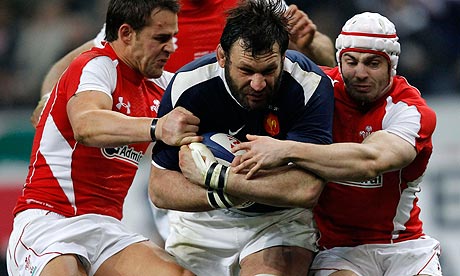
Champions of Europe or champions of the world; which is harder? No difficulty with that one, but when you ask whether it's more difficult to get to a World Cup final or to win a grand slam in the Six Nations, then I'd argue it's less obvious. In fact, if the World Cup seedings help you into one of the less demanding groups at the global gathering – and this I have to admit is on the evidence of being at just the one World Cup – I'm pretty certain the slam takes the prize.
Why? Well, 2011 in New Zealand suggested that it is possible to get to the World Cup final after just two or three difficult games whereas, depending on how the fixtures fall, the slam can be a shocker because no game is a walkover and three of the five could be away from home, rather than on (supposedly) neutral territory.
So why should this come to mind just now? Well, the World Cup is still fresh in the memory and this weekend preparations for the Six Nations start in earnest when Wales jump on the plane for Poland and what has become our base camp at Spala. Familiar territory, perhaps, after twice going there in the buildup to the World Cup, but my guess is that our programme will be very different, if only because of the time available to us – two weeks before the Six Nations as opposed to getting on for four months before the World Cup.
And for anyone who doesn't believe that having time on your side makes a difference, then the Wales analyst, Rhys Long, made a prediction before the World Cup that I'm sure was backed up by the statistics in New Zealand. Rhys looked at the run of results in the autumn internationals, when the southern hemisphere sides come up here after having the best part of four months to get ready. He pointed to the disparity in the points and wondered whether the north v south matches – including the new Tri-Nations partner, Argentina – in the World Cup would be any different.
You don't have to be a statistical genius to work that one out; by and large one score covered most games and just look at the All Blacks v France final or the pool game between Ireland and Australia in Auckland, which turned the whole structure of the expected competition on its head.
Given equal amounts of preparation time, as Rhys predicted, it suggests that results tend to be a lot closer, but going into the Six Nations we have just the two weeks (and not even that with some of our guys playing away from Wales); the same time we get together before Australia, South Africa, and New Zealand come here each autumn. It means the way we prepare is likely to be radically different.
For a start, you wouldn't expect the same levels of contact and physicality that preceded the World Cup and which gave us such a solid foundation back in September. A week of bashing and crashing is the last thing the majority of the Welsh players need right now. They have been pretty much full on since the start of the season and Spala's ice baths and cryogenic facilities are more likely to be used to heal damaged bodies rather than make increased training loads possible.
The main party heads off on Sunday, but those guys from clubs involved in Europe that day will follow on Monday. My guess is that the boots won't be put on until possibly Thursday, unless the player involved has had an easy season so far and needs the work.
It is more likely that, instead of a pre-dawn run and a session in the gym before breakfast, as happened last summer, a lot of our time will be spent on analysis and getting the technical stuff sorted. Each player will be judged separately, but at the start of the week the majority of the guys can look forward to a mixture of cryotherapy, massage and video overload before the serious stuff on Thursday, Friday and Saturday ahead of the flight back on Sunday.
Then it's Ireland in Dublin first up and England at Twickenham before France come to Cardiff in mid-March to round things off. Now compare that with New Zealand kicking off their World Cup against Tonga before meeting Japan and Canada – admittedly after France – and you'll perhaps see what I mean.

